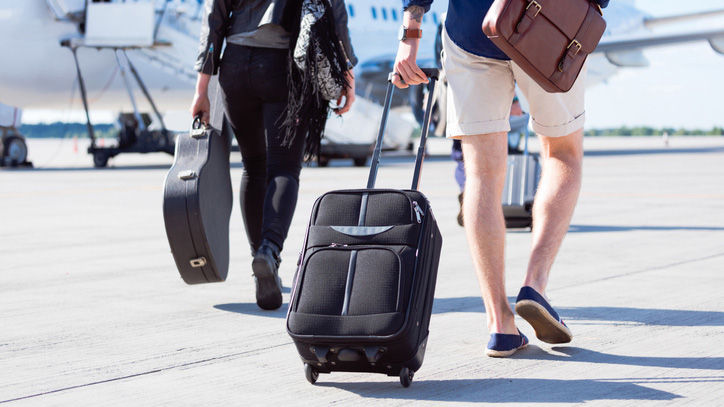Everything you need to know about flying with your guitar
Taking your precious guitar on a plane, or out on the road, can be a daunting prospect. We're here to help you navigate...

All the latest guitar news, interviews, lessons, reviews, deals and more, direct to your inbox!
You are now subscribed
Your newsletter sign-up was successful
For any musician, the chance to take your art out on the road and connect with fans from far afield is an exciting one. But what if said fans are in a different country, or if taking to the skies to travel is unavoidable? The prospect of packaging up your precious guitar and entrusting airline baggage handling professionals to safely get it from A to B could be enough to put you off, but it needn’t.
In this article, we will explain some things to consider when traveling with your guitar. From best practices and steps you can take before you travel to ensure your guitar has the best chance of arriving at your destination in one piece, we’re here to help.
Do your research before you travel

Before you get all excited and start booking your flight tickets, take a minute to plan out how your guitar will complete its own airline odyssey safely. Unfortunately, it’s not as simple as throwing it in a gigbag and rocking up to the boarding gate.
Different airlines – and even different countries – have varying rules and restrictions regarding traveling with musical instruments. Some may allow you to carry your guitar on as cabin baggage, while others may require it to be checked in. Research the airline and country-specific guidelines to avoid unpleasant surprises at the airport.
You’re also going to want the best possible case your budget will allow. Seriously, this isn’t the area to skimp. Protect your guitar like a precious gem by investing in a sturdy, well-padded travel case. We’ll outline some other case-related things to think about later on in this guide.
Once you’ve got a case, and before you board the plane, remember to loosen the guitar strings slightly to relieve tension caused by changes in air pressure. This simple step can help prevent damage to the neck and ensure you don’t return to find cracks in the wood.
It’s also worth padding out the inside of the case further if you can; T-shirts, towels, whatever you can find that will keep the instrument rock-solid in its safest position. Another handy tip is to locate some of those desiccant sachets you find when you buy new electronic products. These will help protect the guitar from changes to humidity, so keep hold of them when you come across them in future!
All the latest guitar news, interviews, lessons, reviews, deals and more, direct to your inbox!
Navigating airport procedures

As you embark on your musical adventure, airport procedures can be a potential hurdle. You can give yourself a calmer experience by simply arriving earlier at the airport, especially if you plan to carry your guitar on as cabin luggage. Early arrival allows for a stress-free check-in process and helps you avoid rushing through security.
When traveling with your guitar as cabin baggage, declare it at the security checkpoint. Alternatively, if cabin space is limited, some airlines offer gate-check services for musical instruments. Request this option to reduce the risk of mishandling during the flight.
Finally, while it might seem optimistic, affixing a few visible ‘fragile’ stickers to your guitar case will give it a fighting chance of being treated kindly by airline baggage handlers. Doesn’t hurt to try, right?
Legalities and documentation

Ensuring you have the right paperwork is crucial to avoid legal hassles when traveling internationally with your guitar. Thankfully, while there is paperwork to consider, it’s fairly straightforward to understand.
First, we’d advise reading up on your domestic government’s website to see about any restrictions or red tape you’ll need to consider. For example, in the UK, where Britain’s exit from the European Union created a world of new bureaucracy, you’ll find Government-approved information relating to musicians’ travel on its website. Essentially, in the UK, you can apply for a Musical Instrument Certificate, which lasts for three years and can be used multiple times within that period. You’ll also find the UK’s Musicians’ Union offers up-to-date information to support traveling musicians and give them the best chance of arriving at their destination with their instruments intact.
Another thing you’ll need to consider, and one that will require you to have a full understanding of the tonewoods in your guitar, is CITES documentation. Essentially, for guitars comprising protected wood species, like Ebony or Rosewood, you’ll need the required CITES (Convention on International Trade in Endangered Species of Wild Fauna and Flora) documentation to comply with international trade regulations. It’s a small detail but, if not accounted for, one that could quite conceivably cause you, at best, delays at the other end; or worse, see your guitar being confiscated.
Insurance and repairs

If you haven’t already got an insurance policy, we’d say international travel would be a good reason to change that. Your existing home insurance may cover the guitar within its country of origin but that might not extend to international travel.
Thankfully, there are some trusted, reputable companies offering dedicated musician’s insurance, like Allianz, offering financial protection and peace of mind in case of loss, theft, or damage.
Additionally, if you are super organized, you might consider researching reputable instrument repair shops at your destination in case any unforeseen mishaps occur during your trip. Can’t be too careful.
Guitar cases

When you’re looking for the best guitar case for air travel, you have a decision to make. Are you looking to take your guitar with you, never letting it out of your sight? If so, you’ll be better served with a rigid, but not hard-shell, gigbag. This is because you’ll likely need to store the guitar in the overhead lockers, a feat made slightly simpler when the case in question isn’t hard.
If, on the other hand, you’re happy to entrust your guitar to the baggage handlers, and leave it in the hold, then go for as robust and rigid as you can. Additionally, you’ll want to ensure it has reliable locks and the all-important fragile stickers we mentioned earlier.
While you could look for value if you’re going down the gigbag route, we’d still recommend sticking with a trusted brand like Gator or SKB. For hard cases, you’ll often find the best cases are the ones from brands like Fender and Gibson themselves. These will cost you a fair amount, but you can at least rest easy knowing your guitar is safe.
Bon voyage!
Congratulations! You're ready to embark on your international musical adventure with your guitar. Armed with this guide, you can confidently navigate airport procedures, protect your instrument, and avoid potential problems along the way. For all the horror stories you’ve probably heard, traveling with your guitar doesn’t have to be a nightmare if you stick to our tips, plan ahead accordingly and give yourself plenty of time to tick all the relevant boxes.
- Best travel guitars: acoustics and electrics for portability and performance
Chris Corfield is a journalist with over 12 years of experience writing for some of the music world's biggest brands including Orange Amplification, MusicRadar, Guitar World, Total Guitar and Dawsons Music. Chris loves getting nerdy about everything from guitar gear and synths, to microphones and music production hardware.

